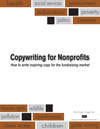This is the holiday season so I’m only writing one blog post this week. Today’s post is based on two news articles I read recently. The headline “hints” at the subject of each article.
On to the news . . .
News Story #1: A New Decade for Women-Focused Philanthropy (Huffington Post)
Every heard of the giving circle “Dining For Women?” It’s based on a giving method that’s hundreds of years old: mutual aid societies. A 21st-century term — in addition to “giving circle” — might be “parties with a purpose” in the words of the news article.
How does it work? The concept is women helping women help themselves. (Hmm. Diagram that sentence!) The founder and president, Marsh Wallace, launched the movement in 2003. Basically women meet for dinner; hear a presentation about the needs of a charity serving women in a developing country; and then donate to the charity.
“Dining For Women” brings in an average of “… $25,000 per month for one of a dozen charities.” There are 160 dining chapters in 39 states and 3 countries.
Why do I share this? Could your charity benefit by a partnership with Dining For Women? Or could you mirror their model to periodically raise funds for your local or regional charity? Just host dinner sessions in your local area and not worry about starting a national movement. It might work for those of you whose mission is local as opposed to helping women in developing countries.
News Story #2: Crowdsourced Philanthropy: If You Ain’t Cheatin’, You Ain’t Tryin’ (Huffington Post)
To quote the article, “Crowdsourced Philanthropy is the buzzword for an online voting competition that determines the distribution of grant money to good causes.” Winning depends on getting enough votes.
The author of the article (who works for DoSomething.org), isn’t too keen on these competitions.
– They tax a charity’s resources. The charity must repeatedly rally its supporters to vote … often in lieu of other calls to action.
– The competition can be “gamed.” It’s possible for less-than-honorable nonprofits to gain an edge unfairly. Dishonesty is rewarded. And when the prize is a sizable grant (in one case it was $500,000), the temptation to cheat (or at least bend the rules) is high.
The article shares — in considerable detail — four ways these online voting competitions can be gamed.
Why do I share this? Do your homework BEFORE you consider entering your charity into any crowdsourced philanthropy competition. Make certain the competition is designed to prevent the four cheating methods described by the news article.
I hope these two articles are useful to you. The first article as an idea to raise funds for a charity serving women. The second article as a caution. Don’t enter poorly designed competitions. Don’t tax your organization when your honest efforts can be easily undermined by a less-than-honorable nonprofit. And sadly, they do exist.
Have a safe and enjoyable New Years Eve celebration. I’ll see you again in 2011.

{ 1 trackback }
{ 0 comments… add one now }